
Fast, affordable Internet access for all.

The key for states to unlock their portion of the $42.5 billion in federal BEAD funds is the submission and approval of their Five Year Action Plans and Final Proposal. The infrastructure law requires states to first file an action plan, and then prepare more detailed Initial Proposals, allowing residents and stakeholders to submit public comments.
So far, 14 states have filed their Five Year Action Plans with the National Telecommunications and Information Administration (NTIA), the Treasury Department agency in charge of allocating the funds to each state and U.S. territory. According to the NTIA’s website, Maine, Louisiana, Delaware, Georgia, Hawaii, Idaho, Kansas, Montana, North Carolina, Ohio, Oregon, Pennsylvania, Utah, and Vermont have all filed their draft Five Year Action Plans.
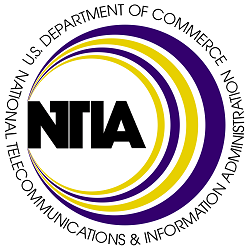
The states that are now in the process of completing their Initial Proposals include: Delaware, Kansas, Louisiana, Montana, Ohio, Tennessee, Vermont, Virginia and Wyoming.
Today, we will look at two states (Maine and Louisiana) and follow up with the others as we are getting a clearer picture of how each state intends to put this historic infusion of federal funds to use.
Maine
With an historic effort underway to expand high-speed Internet availability to every corner of the country, one vital aspect of the nationwide initiative is to ensure that communities that have been left behind get access to the knowledge and digital skills necessary to fully participate in a modern Inter(net) connected world.
It necessitates the creation of an army of digital navigators to work on the front-lines with the right tools as their disposal. To that end, Arizona State University (ASU) and the Marconi Society announced the creation of a first-of-its-kind Digital Inclusion Leadership Certificate program that aims to provide “a foundational understanding of the technology, policy and digital inclusion essentials needed to create true digital equity.”
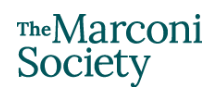
University and Marconi Society officials say the Digital Inclusion Leadership Certificate is the nation’s first professional certificate in the field as the program is geared to educate individuals and teams at all levels of government, as well as nonprofits and anchor institutions such as libraries, housing authorities, and healthcare organizations who work with historically marginalized populations that either lack access to broadband or are unsure of how to take advantage of the opportunities high-speed Internet connectivity delivers.
“This certificate is for anyone who wants more background on broadband technologies and digital inclusion, including those who will be drafting plans and managing programs under new federal funding,” ASU’s website further elaborates.

This week on the show we're featuring an episode of our new Building for Digital Equity podcast, which looks at how organizations and individuals around the country do work at the intersections of broadband infrastructure, affordability, access, and skills. From frontline specialists helping households sign up for the Affordable Connectivity Program to building small, digital equity-minded ISPs in Arizona, this series showcases the work and lessons from those helping folks get and stay connected in our communities and towns.
On this episode of the podcast, we talk with Brandon Forester - the National Organizer for Internet Rights at Media Justice. Christopher and Brandon talk about helping communities build more agency over how technology shows up in their neighborhoods and among the digital communities they create for themselves. He shares how Media Justice came to prioritize prison phone justice as one of its first issues, what organizing is and how local solutions may differ across communities, and the need to avoid purity politics in doing digital equity work.
This show is 20 minutes long and can be played on this page or using the podcast app of your choice with this feed.
Transcript below.
We want your feedback and suggestions for the show-please e-mail us or leave a comment below.
Listen to other episodes here or see other podcasts from the Institute for Local Self-Reliance here.
Thanks to Joseph McDade for the music. The song is On the Verge and is used per his Free-Use terms.
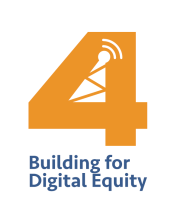
Dave Sevick, Executive Director at Computer Reach in Pittsburgh, has taken his experience helping people with devices and supercharged it for digital equity work. Computer Reach refurbishes computers and sends digital navigators into the home in both urban and rural areas, which is an interesting challenge that many have not attempted. We talk about how they are funded and why they often use Linux-powered devices, among many other topics.
This show is 18 minutes long and can be played on this page or using the podcast app of your choice with this feed.
Transcript below.
We want your feedback and suggestions for the show-please e-mail us or leave a comment below.
Listen to other episodes here or see other podcasts from the Institute for Local Self-Reliance here.
Thanks to Joseph McDade for the music. The song is On the Verge and is used per his Free-Use terms.
With billions of federal dollars on the horizon to support broadband infrastructure and digital inclusion, it is essential that states, local officials, service providers, and other organizations work effectively with Tribes so that those living on Tribal lands get connected.
Last week, the National Digital Inclusion Alliance (NDIA) hosted Dr. Traci L. Morris, Executive Director of the American Indian Policy Institute (AIPI) at Arizona State University for a webinar titled “Indigenous Digital Sovereignty: From the Digital Divide to Digital Equity,” which situated Tribal broadband work and Tribal sovereignty in the context of recent federal funding opportunities like BEAD.
“Sovereignty and self-determination are critical aspects of broadband and telecommunications investments in Tribal communities. Putting in a network is an act of self-determination – it is nation-building. It is exercising sovereignty in the active sense. As the United States makes historic investments [in broadband], we must hold it to upholding its trust responsibility to our Nations.” - Dr. Traci L. Morris
A member of the Chickasaw Nation of Oklahoma, Morris has led AIPI for 10 years, and has 14 years of experience in digital equity and inclusion, network neutrality, and Tribal broadband. Morris co-authored Tribal Technology Assessment: The State of Internet Service on Tribal Lands (2019), which helped to fill a gap in quality data on connectivity needs in Indian Country.
Morris’s webinar dug into her own participatory research data investigating the digital divide in Indian Country, which was prompted by a dearth of quality data representing connectivity needs for Native Americans living on Tribal lands.
Chants for “affordable” and “quality Internet” rang through the corridors of Inglewood City Hall this morning.
The source of that sound came from members of the coalition known as Digital Equity LA who assembled to picket in front of State Sen. Steven Bradford’s Office, publicly calling for an “end to digital redlining” and for passage of Assembly Bill 41 (AB 41), also known as The Digital Equity in Video Franchising Act of 2023.
If passed as is, the proposed bill – which we wrote about previously here – would establish an equal access requirement, anti-discrimination provisions, and a process for the public and local governments to provide input on the franchise agreements governing how cable Internet service providers serve their communities.
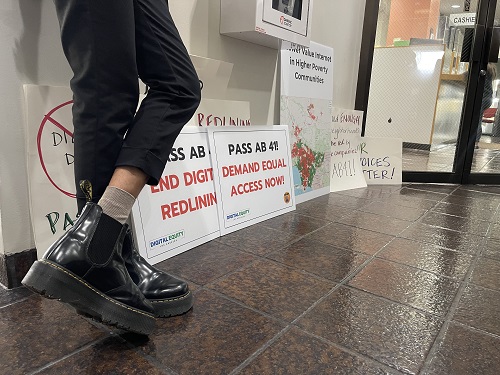
Noting how nearly 98 percent of all broadband subscribers in the Golden State get Internet service through cable companies operating under DIVCA franchises, reforming the franchise law would help reform broadband access – which the coalition says is essential to address the digital divide across one of the largest metro areas in the nation.

Marvin Venay is the Chief Advocacy Officer for Tech Goes Home in Boston, a digital equity organization that has been building tech skills and working on the digital divide for longer than most. Sean Gonsalves talks with him about their process, how they continued to thrive even after the BTOP money dried up years ago, navigating the pandemic, expanding further into Massachusetts, and their future plans.
This show is 19 minutes long and can be played on this page or using the podcast app of your choice with this feed.
Transcript below.
We want your feedback and suggestions for the show-please e-mail us or leave a comment below.
Listen to other episodes here or see other podcasts from the Institute for Local Self-Reliance here.
Thanks to Joseph McDade for the music. The song is On the Verge and is used per his Free-Use terms.
The Community Broadband Networks (CBN) team here at the Institute for Local Self-Reliance (ILSR) is thrilled to announce we will once again welcome a postdoctoral fellow this coming fall to undertake a two-year project that advances policy initiatives in support of expanding broadband access and digital sovereignty for Tribal Nations across the U.S.
It’s the second time the American Council of Learned Societies (ACLS) has selected ILSR as a host organization for a Leading Edge Fellowship, which embeds humanities and social science PhDs with nonprofits committed “to solve problems, build capacity, and advance justice and equity in society.”
Earlier this month, ACLS announced 18 new ACLS Leading Edge Fellows for 2023. In September, one of those fellows – Jessica E. Auer (PhD, History, University of North Carolina at Chapel Hill) – will join the CBN team, kicking off her full-time fellowship as a Tribal Broadband Policy Analyst.
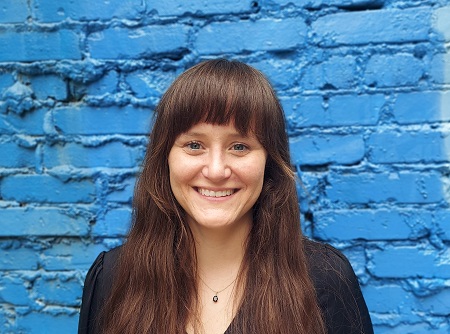
Jessica will conduct original research and writing to help develop policy narratives that can be used to support new and existing tribal broadband efforts.
With less than 60 percent of those living on Tribal lands in the lower 48 states having access to basic broadband connections – as Native Nations have regularly been excluded from policy conversations around these issues – Tribal citizens miss out on educational, economic, telehealth, social networking, and a panoply of other activities that foster community resiliency and democratic engagement in the modern world.
ILSR’s Community Broadband Networks (CBN) Initiative continues to host Let’s Get Going Broadband Bootcamps across the country.
The next two upcoming bootcamps are being sponsored by the New Mexico Office of Broadband Access and Expansion and will be held at Doña Ana Community College in Anthony, New Mexico on June 28 from 9:30 a.m. to 4:30 p.m. Another will be held the following day, June 29, at the Tribal Administration Building on the Pueblo of Tesuque in New Mexico.
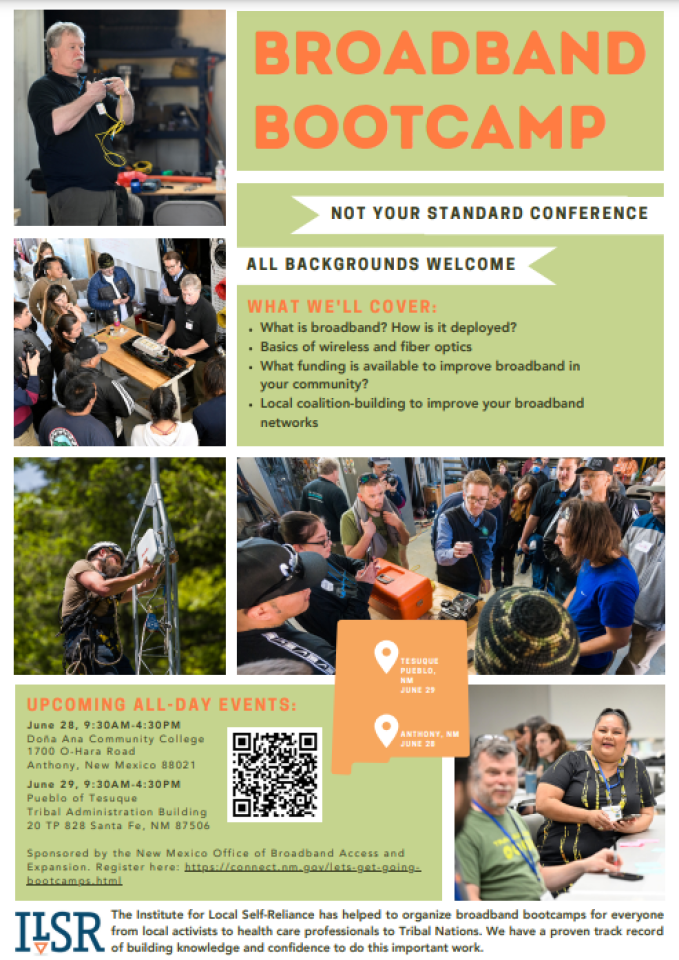
The bootcamp agenda includes:
The in-person, hands-on bootcamps are aimed at helping participants understand broadband and digital equity basics, identify local needs, evaluate options, and chart a path forward. From leveraging existing assets, to financing, to partnerships, to evaluating models for success, this program is designed to demystify every step of the process.
If you are in New Mexico or nearby, there is still time to register here.
Attendance is free, but submission and acceptance of an application is required prior to the event. Space is limited and priority will be given to local community members and small local teams eager to learn together and mobilize locally to improve connectivity.

Brandon Forester is the National Organizer for Internet Rights at Media Justice. We talk about organizing for digital equity and more specifically Brandon's vision for communities having agency over how technology shows up in their neighborhoods and digital communities. We discuss how Media Justice came to prioritize prison phone justice, what organizing is and how local solutions may differ in different communities, and the need to avoid purity politics in doing this work.
This show is 20 minutes long and can be played on this page or using the podcast app of your choice with this feed.
Transcript below.
We want your feedback and suggestions for the show-please e-mail us or leave a comment below.
Listen to other episodes here or see other podcasts from the Institute for Local Self-Reliance here.
Thanks to Joseph McDade for the music. The song is On the Verge and is used per his Free-Use terms.